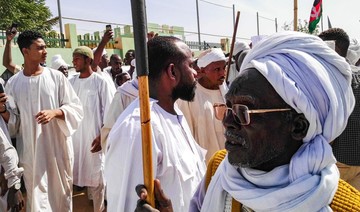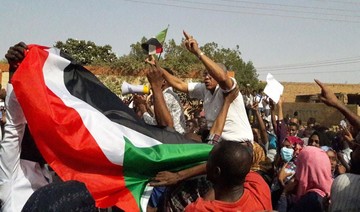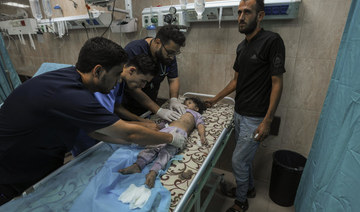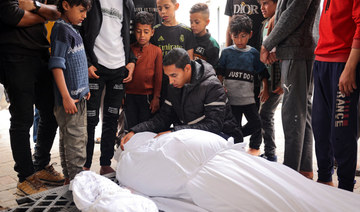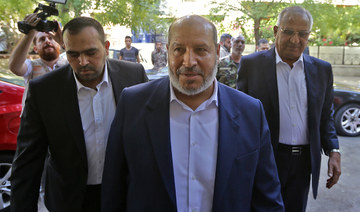KHARTOUM: Sudanese President Omar Al-Bashir on Sunday pledged to bolster rural development, as he seeks to face down anti-government demonstrations that have rocked cities and villages.
The veteran leader has been on a charm offensive with rallies across the country in a bid to head off weeks of protests seen as the biggest threat to his 30-year rule.
Addressing hundreds of villagers in North Kordofan state at a televised event he promised to bring clean drinking water to rural areas “across Sudan” and open a new hospital in the region.
The speech came after he inaugurated a new 340-kilometer (210 miles) highway linking North Kordofan to Omdurman, the twin city of Khartoum.
“Building such a road in present economic conditions is not an easy thing to achieve,” said Bashir, after being escorted to the stage by dozens of men on camels.
“Along this road we will bring electricity to boost the region’s growth.”
Demonstrations erupted in Sudan in December after a government decision to triple the price of bread unleashed frustrations at years of deteriorating living conditions and growing hardship.
Officials say 30 people have died in protest-related violence, while rights group Human Rights Watch says at least 51 have been killed.
Bashir’s attempts to rally support have so far failed to halt the wave of discontent, with the group leading the demonstrations calling for fresh protests over the next few days starting Sunday night.
Bashir and other senior Sudanese officials have repeatedly said that the government can be changed only through elections.
The leader, who came to power in an Islamist-backed coup in 1989, is considering running for a third elected presidential term in polls due next year.
Sudan’s Bashir vows rural development as new protests loom
Sudan’s Bashir vows rural development as new protests loom
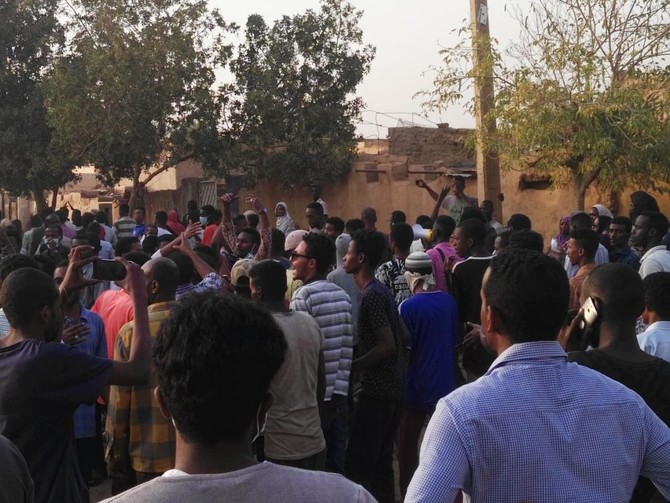
- The veteran leader has been on a charm offensive with rallies across the country in a bid to head off weeks of protests
- Demonstrations erupted in Sudan in December after a government decision to triple the price of bread
Gaza aid pier ready in two to three weeks: US
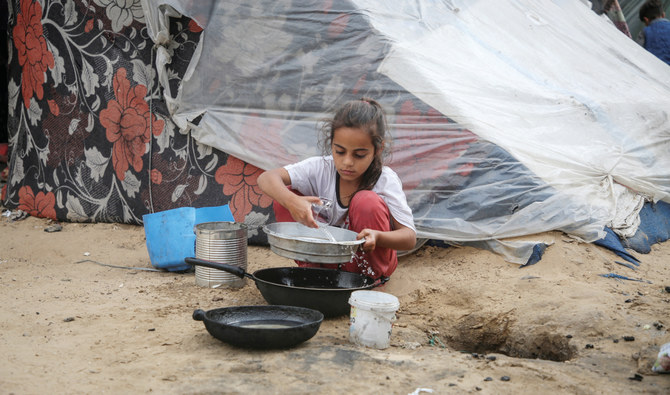
- Israel faces growing pressure to enable more aid deliveries as the UN warns famine is imminent
WASHINGTON: The White House said on Sunday that a US-made pier meant to boost aid to Gaza would become operational in a few weeks but cannot replace land routes with trucks as the best way to feed people in the territory.
Israel’s more than six-month war against Hamas in Gaza has triggered a humanitarian crisis, and it faces growing pressure to enable more aid deliveries as the UN warns famine is imminent.
The Pentagon said last week that the US military had begun building a pier to speed up aid deliveries.
“It will take probably two to three weeks before we can see an operation,” White House national security spokesman John Kirby said Sunday on ABC News.
Kirby said the floating platform to bring more food and other essentials to Gaza will help, but it has limits.
“Nothing can replace, quite frankly, the ground routes and the trucks that are getting in,” Kirby said.
After the killing of seven aid workers in an Israel strike on April 1, which drew international outrage, President Joe Biden bluntly told Israel to change the way it is waging the war.
He said it was imperative that Israel let in more aid and take more pains to avoid Palestinian civilian casualties.
Biden said continued US aid to Israel would depend on such changes being made.
Kirby said Israel is now, in fact, letting in more trucks, including in the particularly hard-hit north of Gaza.
“The Israelis have started to meet the commitments President Biden asked them to meet,” he said.
Plans for the pier were first announced by President Biden in early March, as Israel was being accused of holding up aid deliveries on land.
Kirby also said Israel had agreed to listen to US concerns and thoughts before it launched an invasion of the border city of Rafah in Gaza.
“They’ve assured us that they won’t go into Rafah until we’ve had a chance to really share our perspectives and concerns with them,” Kirby told ABC.
US Secretary of State Antony Blinken is due to visit the region next week and Kirby said he would continue pressing for a temporary ceasefire that Washington wants to last for at least six weeks.
A Hamas official said a delegation will visit Cairo on Monday for talks to secure a ceasefire.
Jordanian PM, Palestinian president meet in Riyadh
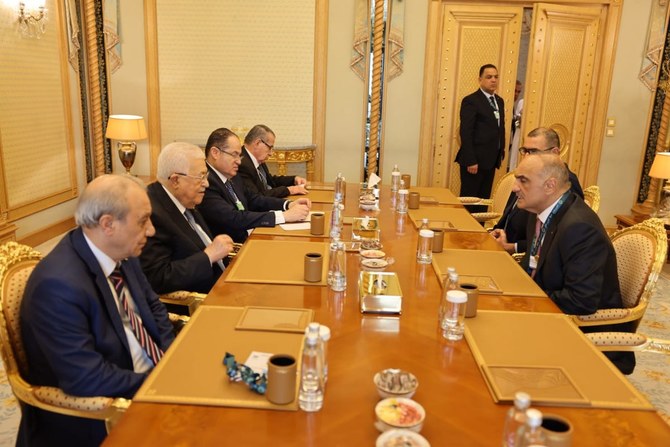
- Khasawneh underlined Jordan's efforts to halt the war in Gaza and ensure sustained humanitarian aid flow
RIYADH: Jordan’s Prime Minister Bisher Khasawneh met with Palestinian President Mahmoud Abbas during a special session of the World Economic Forum in Riyadh on Monday, Jordan News Agency reported.
Khasawneh reaffirmed Jordan’s support for the Palestinian cause and its commitment to providing assistance to Palestinians in their pursuit of legitimate rights on their national soil.
He said that lasting peace and stability in the region depend on a political resolution within the framework of a two-state solution.
Khasawneh said that such a solution should lead to the establishment of an independent, fully sovereign Palestinian state, with East Jerusalem as its capital, based on the lines of June 4, 1967.
He underlined Jordan's efforts to halt the war in Gaza and ensure sustained humanitarian aid flow.
Jordan remains committed to delivering aid to Gaza through both land crossings and airdrops conducted by the Jordanian army, Khasawneh said.
In a CNN interview earlier this month, Jordan’s Queen Rania explained the reason for the airdrops in an area where the UN has reported a widespread food crisis.
“We found that after trying so hard in vain to persuade Israel to open the land access points, that we had to do something. We couldn’t just sit idle and watch people starving,” she said.
Khasawneh also warned against any Israeli military assault on the Palestinian city of Rafah.
Both parties agreed to convene meetings of the Jordanian-Palestinian Joint Higher Committee in Amman in early June, led by the respective prime ministers.
GCC countries can play pivotal role in Africa’s economic development, African stakeholders say
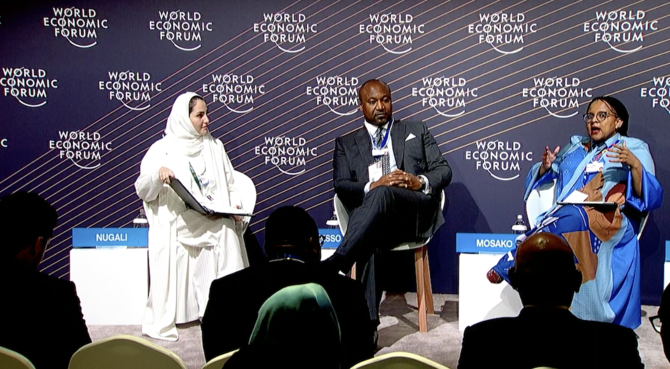
- Economic relations between Africa and the GCC are set to grow significantly in the coming years
RIYADH: Member nations of the Gulf Cooperation Council can play a pivotal role in developing African economies, a special meeting of the World Economic Forum in Riyadh was told on Sunday.
Economic relations between Africa and the GCC are set to grow significantly in the coming years, economists have said, driven by mutual interests in economic diversification, investment and sustainable development.
Denis Christel Sassou Nguesso, the Republic of Congo’s international cooperation minister, said countries in central and western Africa had traditionally looked to Western powers, such as the US, France and the UK, for assistance with their development but were increasingly looking to forge links with GCC countries.
“It’s a good opportunity and position to start to work on this cooperation with (countries such as) Saudi Arabia, UAE, Qatar, Oman and Bahrain. They can help (African) countries to develop their economies and infrastructure projects,” he said.
“We’re not looking for an equal economy (with GCC states), but we’d like to build some bridges toward partnerships between our countries, to promote the public-private partnership.”
Boitumelo Mosako, CEO at the Development Bank of Southern Africa, told the panel that the GCC and African Union were founded on the same date, which coincides with Africa Day.
The GCC and the Organization of African Unity, which was replaced by the African Union, were both founded on May 25.
This was a symbol of the strong partnerships that had evolved between Africa and GCC countries, especially in direct trade, Mosako said.
“When it comes to infrastructure, that is where I see the greatest opportunity. As we all know, (Africa) is a continent with an infrastructure backlog, but we are one with aspirations of implementing an African free-trade agreement.”
But in order for this to be achieved, infrastructure projects had to be built quickly, which would not only benefit African economies but also global partners as Africa’s exports to those countries would be able to increase exponentially, Mosako said.
Highlighting opportunities in energy investment from GCC countries, she added: “We have seen this in South Africa, where GCC companies have partnered local entities as part of a renewable energy program, so it’s not something far-fetched, it’s actually happening. It’s an opportunity to close the energy gap for the continent.”
Ousmane Dione, vice president for the Middle East and North Africa at the World Bank, said that at its shortest distance, there were only 26 km between Africa and the GCC, but there was a much bigger metaphorical gap in investment from the GCC states into Africa, which he called a “land of opportunity.”
He said that by 2035, there would be 430 million young Africans coming into the labor market competing for just 100 million jobs if current policies remained in place.
This could either be a “demographic liability or a demographic dividend” depending on how other countries viewed it, he said.
“I see the GCC countries really being a part of what will be the future of that relationship, in terms of a partnership.”
Houthis expecting ‘hostile’ reaction from US over Red Sea attacks, drone downing
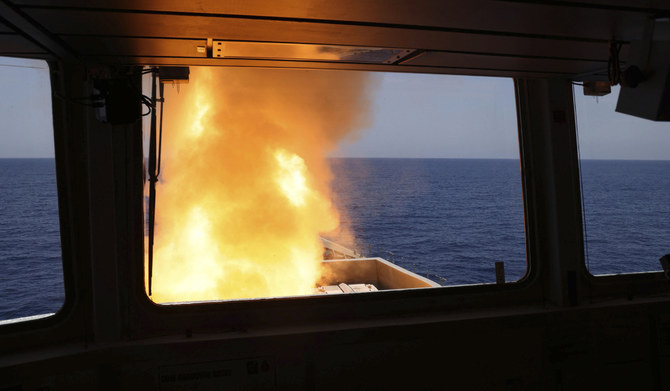
- US Defense Department says MQ-9 Reaper crashed in Yemen
- British-owned oil tanker damaged after being hit by missiles
AL-MUKALLA: The Houthis claim the US is planning a new round of strikes on Yemen in response to its attacks on ships in the Red Sea and the downing of an American drone.
In a post on X on Saturday afternoon, Hussein Al-Ezzi, the militia’s deputy foreign minister, said: “Now America and its mercenaries are considering new hostile plans, and we tell them the same thing: you will fail.”
In a separate message, posted on X on Saturday morning, Al-Ezzi said the Houthis were aware that the US was plotting a fresh military campaign against them and pledged to strike back against US interests wherever they may be.
That warning came after military spokesperson Yahya Sarea said the militia launched missiles at the British-owned and Panamanian-flagged Andromeda Star oil tanker in the Red Sea and shot down a US MQ-9 Reaper drone above its stronghold in the northern province of Saada.
US Defense Department spokesperson Lt. Col. Bryon J. McGarry told The Associated Press on Saturday that an MQ-9 drone had crashed in Yemen and that an inquiry was underway.
The US Central Command said on Saturday morning that the Andromeda Star received minor damage after being hit by missiles launched by the Houthis on Friday afternoon.
Shipping website Marinetraffic.com said the tanker was traveling from the Port of Sudan to an unnamed destination.
Houthi missiles on Friday also fell near the MV MAISHA, an oil tanker controlled by Liberia and traveling under the flag of Antigua and Barbuda, the Central Command said.
Since November, the Houthis have seized one commercial ship, sunk another and launched hundreds of missiles and drones at commercial and navy vessels in the Red Sea, Bab Al-Mandab Strait and the Gulf of Aden.
The group claims it targets vessels bound for or with links to Israel in a bid to force it to break its blockade on the Gaza Strip.
On Wednesday, the Houthis ended a nearly two-week break in their attacks by claiming credit for hitting a US-owned ship, a US Navy destroyer and an Israeli vessel in the Gulf of Aden and Indian Ocean.
Meanwhile, the Yemeni government and the Houthis swapped accusations on Saturday after a drone laden with explosives killed five women in the Maqbanah district of Taiz province.
The government said the Houthis launched the drone at women gathering water from a well and also fired artillery rounds and heavy machine guns into civilian areas and military sites southeast of Taiz.
The Houthi Ministry of Health said three women and two children were killed after a drone launched by Yemeni government soldiers cut through a crowd of villagers getting water from a well in Al-Shajeen village in Maqbanah.
Hamas official says delegation to respond to Gaza truce plan in Egypt Monday
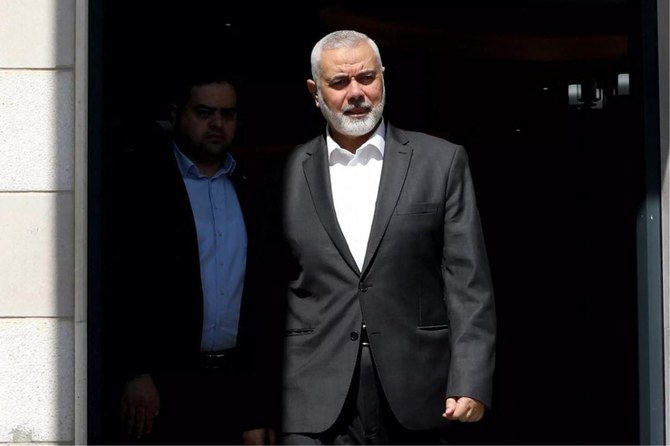
- There is growing international pressure for Hamas and Israel to reach a ceasefire deal and avert an Israeli attack on Rafah
- Hamas delegation to visit Cairo on Monday for ceasefire talks
TEL AVIV: A senior Hamas official on Sunday said that the group would deliver its response to Israel’s latest counterproposal for a Gaza ceasefire on Monday in Egypt.
“A Hamas delegation headed by Khalil Al-Hayya will arrive in Egypt tomorrow... and deliver the movement’s response” to the Israeli proposal during a meeting with Egyptian intelligence officials, said the official who declined to be named told AFP.
Mediator Egypt had sent its own delegation to Israel this week to jump-start stalled negotiations even as fighting in the Gaza Strip rages.
Egypt, Qatar and the United States have been unsuccessfully trying to broker a new Gaza truce deal ever since a one-week halt to the fighting in November saw 80 Israeli hostages exchanged for 240 Palestinians held in Israeli prisons.
Earlier, a senior Qatari official has urged both Israel and Hamas to show “more commitment and more seriousness” in ceasefire negotiations in interviews with Israeli media, as pressure builds on both sides to move toward a deal that would set Israeli hostages free and bring potential respite in the nearly 7-month-long war in Gaza.
The interviews with the liberal daily Haaretz and the Israeli public broadcaster Kan were published and aired Saturday evening. They came as Israel still promises to invade Gaza’s southernmost city of Rafah despite global concern for hundreds of thousands of Palestinians sheltering there and as the sides are exchanging proposals surrounding a ceasefire deal.
Qatar, which hosts Hamas headquarters in Doha, has been a key intermediary throughout the Israel-Hamas war. Along with the US and Egypt, Qatar was instrumental in helping negotiate a brief halt to the fighting in November that led to the release of dozens of hostages.
The sides have held numerous rounds of negotiations since, none of which produced an additional truce. In a sign of its frustration, Qatar last week said it was reassessing its role as mediator.
In the interviews, Qatar’s Foreign Ministry spokesperson Majed Al-Ansari expressed disappointment in both Hamas and Israel, saying each side has made its decisions based on political interests and not with the good of civilians in mind.
“We were hoping to see more commitment and more seriousness on both sides,” he told Haaretz.
He did not reveal details of the current state of the talks, other than to say they have “effectively stopped,” with “both sides entrenched in their positions.”
“If there is a renewed sense of commitment on both sides, I’m sure we can reach a deal,” he said.
The Israeli journalists conducted the interviews in Qatar, which has no formal diplomatic ties with Israel.
Relations between Qatar and Israel have been strained throughout the war, as some politicians in Israel, including Prime Minister Benjamin Netanyahu, have criticized Qatar for not putting enough pressure on Hamas.
Israeli legislators have also cleared the way for the country to expel Al Jazeera, the Qatar-owned broadcaster.
Al-Ansari’s remarks came after an Egyptian delegation had discussed with Israeli officials a “new vision” for a prolonged ceasefire in Gaza, according to an Egyptian official, who spoke on condition of anonymity to freely discuss the developments.
Hamas meanwhile said Saturday it was reviewing a new Israeli proposal for a ceasefire, which came in response to a Hamas proposal from two weeks ago.
Negotiations earlier this month centered on a six-week ceasefire proposal and the release of 40 civilian and sick hostages held by Hamas in exchange for freeing hundreds of Palestinian prisoners in Israeli jails.
There is growing international pressure for Hamas and Israel to reach a ceasefire deal and avert an Israeli attack on Rafah.
A letter penned by US President Joe Biden along with 17 other world leaders urged Hamas to release the hostages immediately.
Hamas in recent days has released new videos of three hostages it holds, which appear to be meant to push Israel to make concessions.
Israel meanwhile has massed dozens of tanks and armored vehicles ahead of an expected offensive in Rafah, where more than half of Gaza’s 2.3 million population is seeking shelter. The planned incursion has raised global alarm because of concerns over potential harm to civilians. The troop buildup may also be a pressure tactic on Hamas in the truce talks.
Israel sees Rafah as Hamas’ last major stronghold and has vowed to attack the militant group there in its bid to destroy its military and governing capabilities.
The war was sparked with Hamas’ attack on Oct. 7 into southern Israel, which killed 1,200 people, mostly civilians, according to Israeli authorities, who say another 250 people were taken hostage. Hamas and other groups are holding about 130 people, including the remains of about 30, Israeli authorities say.
Israel’s retaliatory assault on Hamas has killed more than 34,000 people, most of them women and children, according to health authorities in Gaza, who do not distinguish between civilians and combatants in their tally. The Israeli military says it has killed at least 12,000 militants, without providing evidence to back the claim.


